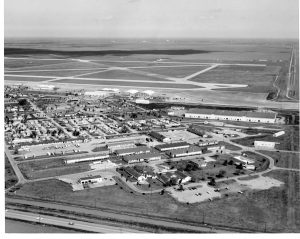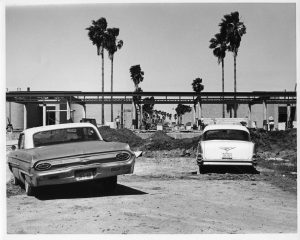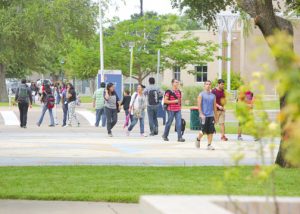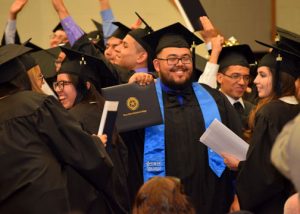 (HARLINGEN) – Texas State Technical College’s Harlingen campus is celebrating 50 years of service to the South Texas region, and some prominent locals are reminiscing on how it all started.
(HARLINGEN) – Texas State Technical College’s Harlingen campus is celebrating 50 years of service to the South Texas region, and some prominent locals are reminiscing on how it all started.
“It was a small campus when I started working there, about four buildings, military barracks that served as dorms and an RV park where the library is today,” TSTC retiree Mike Buck remembered.
Buck worked at TSTC for nearly 32 years from 1976 to 2008. When he retired he was the Vice President of Administrative Services and had seen the campus undergo numerous changes through his tenure.
“I remember when it was a campus of 600 students,” said Buck. “And now the college is serving thousands of students in the area and statewide. That’s significant.”
TSTC was first introduced to the region in 1967 as the James Connally Technical Institute. In 1969, it turned into an independent state system and became Texas State Technical Institute.
Finally, in 1991, TSTI was designated a college and renamed TSTC that many know it as today.
Since 1970 to most recently, the college has built and dedicated at least 26 buildings on campus equipped with state-of-the art technology labs and offers nearly 35 programs of study.
Interim Provost Rick Herrera said this milestone recognizes TSTC’s presence in the Rio Grande Valley.
“It’s been 50 years since the first class started at TSTC in Harlingen,” said Herrera. “And it’s important to recognize the significant impacts TSTC has made while serving the Valley and the state.”
To date close to 30,000 students have graduated from TSTC’s Harlingen campus into the state’s workforce, earning certificates and associate degrees in high-demand technical careers. These students join the more than the 100,000 who have graduated from the college’s 10 campuses statewide.
Serving as TSTC’s leader for more than 30 years, Dr. J. Gilbert Leal was on the front lines and recalls some of the college’s history like it happened just yesterday.
“It’s hard to believe 50 years have flown by and TSTC is still here doing great things,” said Leal. “Many people gave us a chance and TSTC has proved time and time again that although it was a challenge to grow, we persevered.”
Leal began at TSTC as an Adult Basic Education instructor while TSTC was still TSTI sitting on only 25 acres and offering a handful of programs.
As the campus and its services grew, he served front and center as the Director of Admissions, then the campus’ General Manager from 1978 to 1983 before he was promoted to President of TSTC in Harlingen.
“TSTC has transformed so many lives through the years,” said Leal. “I’m proud to have played an integral role in that.”
What Leal means is that early on TSTC has been the leader of training and providing students with the technical skills they need to be successful, placing these same students in good-paying jobs throughout the state and attracting industry to the areas where TSTC campuses are located.
Retired TSTC Provost Al Guillen, who worked at the college for 26 years and as the Vice President for Student Learning, said the introduction to industrial advisory committees had a positive impact for the students in the area.
“Each program has an advisory committee that guides faculty and staff in a program’s curricular evolution as industry changes,” said Guillen. “Advisory committee members also serve as direct graduate placement contacts which has led to TSTC’s high job placement rates, many before graduation.”
Guillen added that the Rio Grande Valley is very fortunate that TSTC has been in the region for the last 50 years because much of the population has benefited from hiring local TSTC graduates while many families gained their first college graduate.
“The college has helped break socio-economic cycles that had existed for generations by providing its graduates with employment qualifications that allow them to become professionals and influential citizens of the state,” said Guillen.
Executive Director of Workforce Solutions Cameron and retired TSTC Provost and Vice President of Instruction Pat Hobbs calls TSTC’s presence in the Valley an extremely positive factor in economic development as a training provider for current and incoming industries.

“TSTC is renowned for its industry-trained faculty and high quality graduates with a consistent job placement rate over 95 percent,” said Hobbs. “In the current economy, where up to 80 percent of jobs require technical credentials above the high school diploma, but not a bachelor’s degree, the value of a premier technical college in our workforce area puts our region at a distinct advantage.”
Hobbs added, “Our Valley would not be what it is today without TSTC in Harlingen’s contributions to workforce development.”
Javier Deleon, TSTC’s Executive Vice President of Governmental Affairs, has been with TSTC for 30 years and said it has been an honor working with TSTC Chancellor Mike Reeser, former TSTC President Cesar Maldonado, President Emeritus Leal and other colleagues like Guillen.
“Under Leal’s and Maldonado’s leadership TSTC saw huge transformations in campus size, program offerings and student population,” he said. “And now Chancellor Reeser is catapulting us to the next level.”
Deleon said he is excited to see where the next 50 years takes TSTC, especially with the new direction the college is taking with its outcome-based funding model and money back guarantee initiative recently implemented.
“We are where we are today because of progression,” said Deleon. “And because of the support we have received from past and current state legislators and community leaders. Without them nothing could have been possible.”
Deleon encourages everyone to remember TSTC’s past, but to also look toward the future and how TSTC is leading the way in higher education.
In the words of Guillen, “Long live TSTC and long live TSTC in Harlingen.”